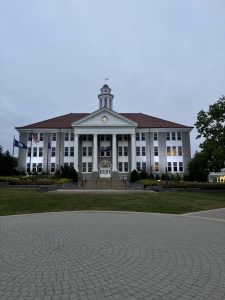Climate Change Makes It’s Mark Locally and Globally
February 11, 2020
According to The National Aeronautics and Space Administration (NASA) and the National Oceanic and Atmospheric Administration (NOAA), 2019 was the second warmest year recorded in history since 1880. This announcement raises local and national concerns regarding the current implications of climate change.
Locally
Environmental science teacher Jonathan Kraut gave his insight on local causes and effects of climate change in Fauquier County.
He began by emphasizing that Fauquier is an agriculturally-based county, contributing to the methane input to the atmosphere. “It’s a necessary evil… Agriculture is one of those things that are going to have to be around until we find other practices to change that,” he said
Kraut listed off a few other factors including population, fossil fuels, impervious surfaces, and the Albedo Effect, but clarified that these were not much of an issue in Fauquier. “This particular area, it’s not as prevalent in the way of climate change [regarding] what we contribute or how we’re affected by it,” he said.
According to Kraut, society needs to put more effort, both locally and nationally, into research and development in order to find other means of fuel. “If there’s some way one of you guys, [students], could figure out the power of nuclear fusion. That would be pretty solid,” said Kraut laughing.
Along with harnessing the power of nuclear fusion, Kraut recommends that students focus on conserving resources and become involved in processes like reduce, reuse, recycle. “As opposed to just throwing your bottles in the recycling bin, figure out what happens to it afterward so you’re kind of aware of the process it goes through;, it’s not just immediate,” he said.
Nationally
The Australian fires are one of the leading issues that climate change globally affects. According to the Climate Council Australia, a non-profit climate change information center, climate change decreases the length of the cool-season rainfall. The Climate Council concluded that this decrease is directly related to the Australian bush fires, and conditions will only worsen as time goes on.
CNN published statistics on the Australian fires on January 6. They reported 24 dead and two missing in New South Wales (NSW). Four hundred and eighty million animals have died, with koalas facing high casualties, in NSW. Overall, more than 14.7 million acres have burned across the country.
The Australian fires are just one of many other concerns surrounding climate change. From Southern Africa’s shrinking Lake Kariba, to the flooding in Sudan, to more Hurricane Dorian storms, the fight against climate change may still have a long way to go.
For more information on climate change, visit:https://climate.nasa.gov/, https://www.climate.gov/ and https://www.epa.gov/climate-research to get in-depth research and statistics.
The link below will direct you to the other article featured on the center spread of the newspaper:
https://fhsfalconer.com/3377/news/student-shares-viewpoint-on-how-local-students-can-help/





